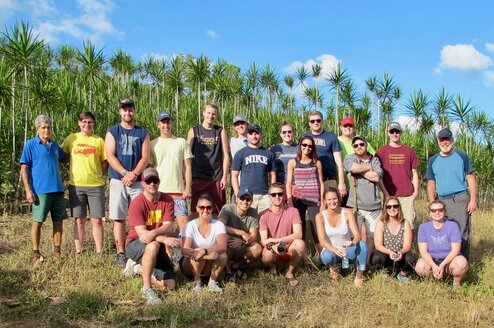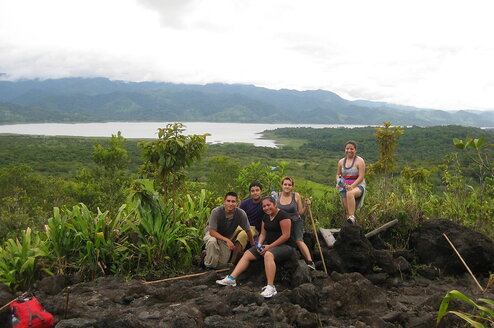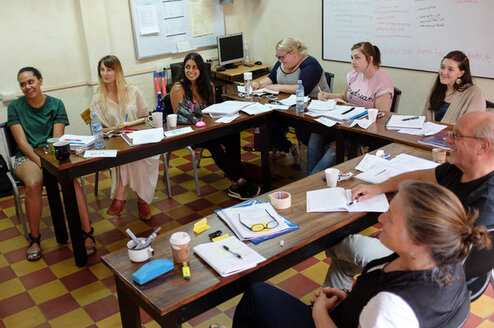Teach English in Central America
Teaching Programs in Central America
Pagination
About Teaching in Central America
Close to the equator, tropical Central America is a prime destination for teachers and lovers of the jungle, ocean, and warm people! Along with the development of different modes of transportation, the region experienced a boom in tourism and interest from foreigners.
Many Central Americans are hoping to learn English, or provide English instruction for their children, the first and next generation of bilingual adults. While most schools require English classes as part of their curriculum, some areas lack the adequate resources to teach proper English.
Thus, ESL teachers are needed to bridge this gap in education by filling job positions in overlooked schools. Explore the natural beauty of Central America as you educate bright, young students, eager to improve their English language skills!
In order to teach English in Central America, most teachers will require TEFL certification. The average salary for teaching in Central America is $250 - $1,400 per month.
Popular Destinations to Teach English Abroad in Central America
Costa Rica:
Many ESL teachers enjoy “la pura vida,” or the relaxed lifestyle adopted by Costa Ricans. It’s no wonder so many educators flock to this small country, when you’re surrounded by tropical animals and gorgeous scenery on a daily basis. Both professional and novice teachers will find work in Costa Rica. TEFL-certified instructors can apply to jobs at public or private schools. Those without a TEFL certification can volunteer to teach in schools that lack the means to hire a native English speaker as part of their staff.
The average salary for an ESL teacher in Costa Rica comes out to about $1000 USD per month. While this may not be the case for every teacher (salary varies with experience, or lack thereof), you will find that goods are fairly inexpensive. A restaurant meal can cost around $3-8 per person, and rent for a one-bedroom apartment in the city of San Jose comes out to $300 roughly.
Guatemala:
Children and adults are aiming to gain fluency in English in many of Guatemala’s cities and towns. Language schools and services provide English lessons to business professionals and government employees. On the other hand, large amount of Guatemala’s youth lacks access to a well-rounded education. Many schools, in underprivileged areas or along the urban periphery, rely on volunteer teachers to provide accurate and entertaining English language lessons to young learners.
While a TEFL certification is not required, schools or employers will want to see some type of confirmation that you have experience teaching or dealing with children (applies to elementary or secondary teachers). Cost of living in Guatemala is quite low. Share rent with fellow teachers, and you will find that you can save a great deal of your earned income. For shorter stays, try living with a host family - you will cut costs and experience daily life in Guatemala!
Honduras:
As a less-popular tourist destination than its neighboring countries, Honduras is often overlooked by ESL teachers. With an abundance of natural sights to explore, Honduras is also known for its cultural and historical wonders. English teachers can find employment in private language schools or tutoring (average monthly salary: $250-$350 USD).
To teach at private bilingual schools, teachers must be native speakers and hold a TEFL certification. As for tutoring, any educator can build a local network to earn a bit of extra money ($10-$15 USD per hour). Though, in general, Honduran schools don’t typically ask for TEFL certifications; teachers without formal training may be able to seek out part-time or lower-pay jobs.
Types of Jobs Teaching English Abroad in Central America
TEFL + Teaching Programs:
The majority of teaching jobs in Central America are obtained through combination TEFL + teach programs. Prospective teachers, typically new and inexperienced educators, travel to their desired location for training.
TEFL courses are taught on-site and will last around 4-6 weeks. After the completion of the TEFL course, program staff will help the newly-certified ESL teachers to find placement in local schools. Often times job placement is not included in TEFL program fees; be sure to stay informed on what’s included to avoid any arguments or misunderstandings. Maximo Nivel, LanguageCorps, and Costa Rica TEFL all offer TEFL + Teach programs in various Central American locations.
Volunteer Teaching:
Volunteers are in high demand in overlooked, underfunded schools across Central America. English language instruction is not uniformly provided even though it is a required course in most primary and secondary schools. It is rare for rural areas to have a native English-speaking teacher in the town, thus, volunteers serve as influential instructors to both their students and fellow teachers.
By providing English instruction in pronunciation and grammar, Costa Rica’s youth will be able to actively seek jobs that the generations before could not. WorldTeach and Projects Abroad both offer volunteer stays, in which volunteers can teach or provide assistance in schools or childcare facilities across Central America.
International Schools:
In every major Central American city, there are several international or bilingual schools looking to fill positions in all subjects, not only English language. Often times these schools are college preparatory schools that use American or European textbooks, and follow a corresponding curriculum.
Many students are children of expatriate families or come from wealthier backgrounds. Teachers looking to work at an international school must typically commit to a one or two-year contract in order to validate a work visa application.
Finding a Job Teaching English Abroad in Central America
Cost of Living:
The average cost of living is comparably lower than in North or South America. If you have a paid teaching job, expect a monthly salary between $500 to $1400 USD. This is a wide range, but keep in mind that your salary will reflect your qualifications (e.g. teaching experience, credentials, prior education, etc.).
Although volunteers will not receive any pay, many programs include housing and meals in initial fees. Thus, it is possible to save while you live and work in Central America given that you adopt frugal tendencies, such as buying groceries rather than eating out at restaurants. To reduce costs, take public transportation and split rent for an apartment or home with fellow teachers.
Qualifications:
If you choose to work in Central America through a TEFL + Teach program, the only requirement is that you are a native English speaker. Most TEFL and volunteer programs prefer applicants to hold a bachelor’s degree and have some experience teaching or working with children. However, these are not strict requirements, and each applicant is looked at individually.
For international school teachers, you must have a bachelor’s degree (or higher), a background in the subject you’ll be teaching, and fluency in English. Most schools are looking for teachers who will be able to stay long-term, and preferably do not have any dependents.
Work Visa:
In Central America, it is difficult for foreigners to obtain a work visa without the help of your employer. With this, teachers, working temporarily in the region, won’t have an easy time applying for a work visa. Teachers who plan to stay longer than 90 days, and less than 1 year, may need to travel to nearby countries and re-enter the country with a new visa (work or travel). Volunteers might not run into as many visa problems, as either (a) the program will make arrangements of (b) you will not be in a particular country for more than 90 days.
Classroom and Work Culture:
In most public and private schools, students are required to wear uniforms. For teachers, it is best to dress business casual. Women should wear knee-length skirts and in general, do not wear blue jeans unless stated otherwise.
In some countries, such as El Salvador, students are accustomed to traditional teaching practices. As teachers dictate notes, or English words and phrases, students will copy them down verbatim.
Questions to Ask:
- How many hours will I teach per week?
- Are teaching materials provided (i.e. textbooks, pencils, electronics)?
- What is the dress code at my school?
- Are housing, insurance, and other benefits included in my contract?
- Will the school or company sponsor my application for a work visa or permanent residency?
- For TEFL courses, is job placement available afterward?























